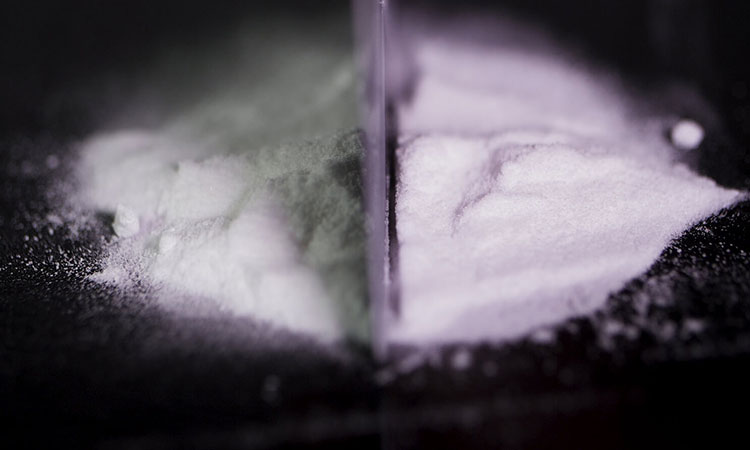
Cocaine is an illicit stimulant drug derived from the coca plant, which grows abundantly in parts of South America. Cocaine works by elevating the concentration of dopamine in the brain, a neurotransmitter responsible for feelings of euphoria, reward, and well-being. Because this high is so desirable, a cocaine user is at risk of an overdose to maintain it.
Also known on the street as ‘coke’ or ‘blow,’ cocaine resembles a white, talcum-like powder that is either snorted or mixed with water and injected intravenously. Cocaine is often perceived as a drug used by wealthy people, given its steep price.
Nonetheless, cocaine use is pervasive, and, after alcohol, accounts for the second most emergency room visits, eclipsing half a million cases per year.
In recent years, cocaine’s costliness, coupled with the surge in opioid abuse, has caused a decline in cocaine use. However, cocaine overdoses have steadily risen, owing to an increased propensity for drug users to mix cocaine with opioids. Over 7,000 cocaine overdose deaths were reported in 2015, and these numbers are predicted to rise.
A Word On Crack

Also, there has a been a rise in crack cocaine, a form of cocaine that is usually smoked and is less expensive. Crack is derived from powdered cocaine by diluting it with water and combining another substance, usually baking soda. The mixture is boiled and is formed into a solid, cooled, broken into pieces, and sold as crack.
Crack is found on the streets in a rock-like form that is generally white, cream, tan, or light brown. Crack’s high concentration contributes to its extremely addictive nature. Although relatively rare, it’s possible for a person to become addicted to crack after just a single use.
Cocaine Overdose Symptoms
In most cases, symptoms of cocaine overdose are very pronounced versions of the drug’s standard effects. Cocaine stimulates the central nervous system, producing an exhilarating high, and an overdose will amplify effects to a level that the body may not be able to handle. This overstimulation can cause numerous symptoms, including the following:
- Headaches
- Chest pains
- Tachycardia (rapid heart rate)
- Arrhythmia (irregular heartbeat)
- Twitching and tremors
- Irritability or paranoia
- Depression or anxiety
- Seizures
- Stroke
The euphoria of cocaine can mask these symptoms, many of which can contribute to permanent damage. Severe cocaine abusers are at extreme risk for heart attacks, strokes, seizures, or even coma.
Cocaine Overdose Signs
If you suspect someone you know is on the verge of an overdose, there are several warning signs to look for, such as the following:
- Elevated blood pressure and body temperature
- Talkativeness and hyperactivity
- Confusion
- Restlessness or agitation
- Excessive teeth grinding or chattering
- Excessive sweating
- Respiratory or kidney failure
- Cerebral hypoxia
- Cardiac arrest
Cocaine overdoses can devastate the human cardiovascular system. If you notice the aforementioned signs are present following cocaine use, it is critical to seek emergency medical help immediately.
How Much Cocaine is Too Much?
An overdose of cocaine usually transpires either because the user ingests too much in a single dose or because they continually use cocaine to maintain the euphoric high, which lasts less than an hour. The latter cause of overdose is often the most dangerous since the user doesn’t realize how much they’ve consumed until it’s too late.
The exact amount of cocaine required to precipitate an overdose varies depending on several risk factors. For example, if cocaine was taken alongside other substances such as alcohol or heroin, this is a significant factor that could contribute to an overdose, because the depressant effect of such substances can mask cocaine’s stimulant effects. Moreover, combining other stimulant drugs with cocaine only exacerbates cocaine’s adverse effects.
Beyond concurrent substance use, an individual’s body chemistry, tolerance level, and age play a role, as well as the method of administration used and the purity of the cocaine. Mixing cocaine with water then injecting it can produce a fatal reaction from just 20 mg in some cases while snorting the drug nasally usually requires much more.
In Case of Overdose

If you recognize these warning signs and symptoms in yourself or a loved one, call 911 or seek emergency medical care immediately.
Death from cocaine overdose can happen quickly, so time is always of the essence in these situations.
While waiting for emergency help to arrive, there are a few things one can do to help mitigate potentially life-threatening overdose symptoms, including the following:
- Apply a cold compress to the head and neck to maintain body temperature
- In case of seizure, clear the area of hard objects or sharp edges upon which the person could injure themselves
- Stay with the person until help arrives.
Treatment for Cocaine Addiction
While there are no medications currently indicated to treat cocaine addiction or withdrawal, it is still a very treatable condition. Frequently, this begins with a clinical detox and is closely followed by a transition to a partial hospitalization, inpatient, or outpatient addiction treatment program.
Our center offers an integrated, evidence-based approach to addiction treatment that includes behavioral therapy, counseling, and group support. Our center employs compassionate medical professionals and certified clinicians who specialize in addiction and provide clients with the skills they so desperately need to recover and enjoy long-lasting sobriety and wellness.
Recovery is a life-long endeavor, but thankfully, you don’t have to do it alone. If you or a loved one are struggling with an addiction to drugs or alcohol, please contact us today and learn how we can help!
⟹ READ THIS NEXT: Long-Term Cocaine Effects on the Body and Brain